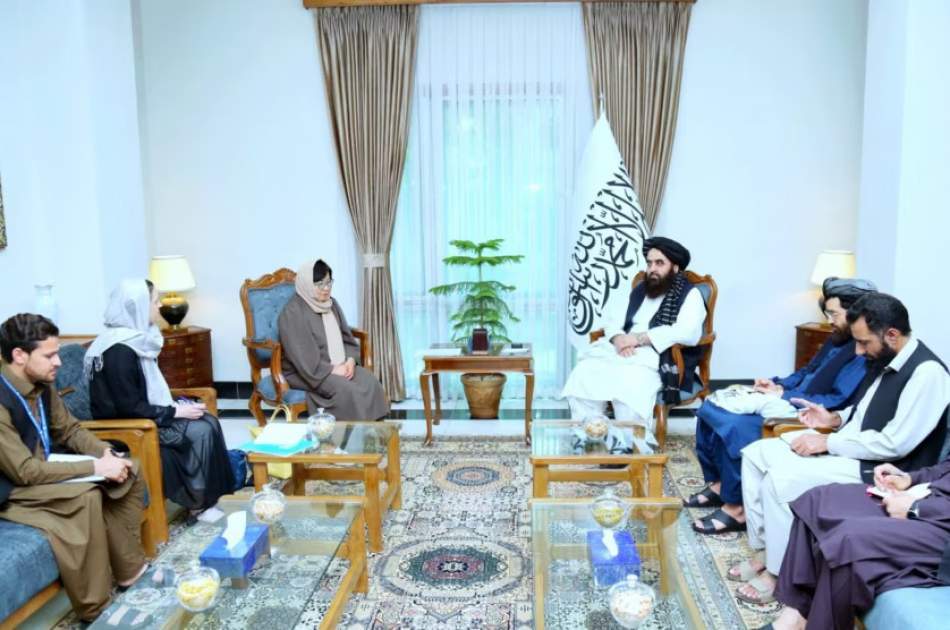Acting Foreign Minister of the Islamic Emirate Amir Khan Muttaqi met with Rosa Otenbayova, the UN Secretary-General's Representative and Head of the UN Assistance Mission in Afghanistan (UNAMA), on the need to follow up on the issues raised at the third Doha meeting.
Publish dateFriday 12 July 2024 - 14:56
Story Code : 293414
Afghan Voice Agency (AVNA)-Kabul: The Ministry of Foreign Affairs of the Islamic Emirate government said that the acting head of the ministry, Amir Khan Muttaqi with the UN Secretary-General's Representative Rosa Otenbayova and the head of the UN Assistance Mission in Afghanistan (UNAMA) to discuss the issues raised at the Doha meeting.
Zia Ahmad Takal, deputy spokesman for the Islamic Emirate's foreign ministry, said in a statement that the meeting discussed the third Doha summit and the necessary measures after the summit.
According to Takal, Amir Khan Muttaqi expressed hope that after the third Doha summit, progress would be made in the field of financial and banking sanctions and alternative livelihoods to drugs.
According to Takal, the head of UNAMA said that the government of the Islamic Emirate should continue to follow up the third Doha talks in cooperation with the relevant authorities.
"Ms. Rosa said it was necessary to hold awareness-raising meetings with diplomatic circles in Kabul on the post-Doha 3 discussions. At the end, the two sides pledged to follow up the issues raised at the Doha 3 meeting together," he added.
The third Doha Summit was held in Doha, Qatar, on June 30 and July 1, with the participation of special representatives of countries and international organizations, focusing on banking problems, fighting drugs and strengthening the private sector in Afghanistan.
UN Under-Secretary-General for Political and Peace Affairs Rosemary Di Carlo said at the end of the third Doha summit that the process was ongoing and that "we are still at the beginning."
"This assessment called for a more constructive process with clear requirements and expectations for all parties. In this regard, we are pursuing a principled step-by-step approach with a clear understanding of the outcomes and commitments for all parties.
Di Carlo said the Doha meeting with the Islamic Emirate delegation discussed inclusive governance and respect for minority rights.
Zabihullah Mujahid, spokesman for the Islamic Emirate government, who led the government delegation to the Doha meeting, acknowledged the concerns of the participants about the education of girls and women, saying it was also a concern of Afghans.
Di Carlo, who chaired the third Doha meeting, said the discussions between members of the international community and the Islamic Emirate were "comprehensive, frank and effective" and that all parties expressed their expectations and discussed the private sector and drugs.
Di Carlo added that there are widespread obstacles to the growth of Afghanistan's private sector, which negatively affect the economy and livelihoods of Afghans.
The spokesman of the Islamic Emirate government at the Doha meeting called the opposition of some countries to the policies of the interim government normal, but stressed that differences should not increase to the point that powerful countries use their leverage to exert security, political and economic pressure on the government of the Islamic Emirate. impose.
He praised the humanitarian aid of the international community, stressing that the lifting of unilateral and multilateral sanctions, the release of frozen assets of the Central Bank of Afghanistan and the provision of development aid are the basic solutions for Afghanistan's economic growth.
avapress.net/vdccs1qi02bqo08.-ya2.html
Tags
Top hits







